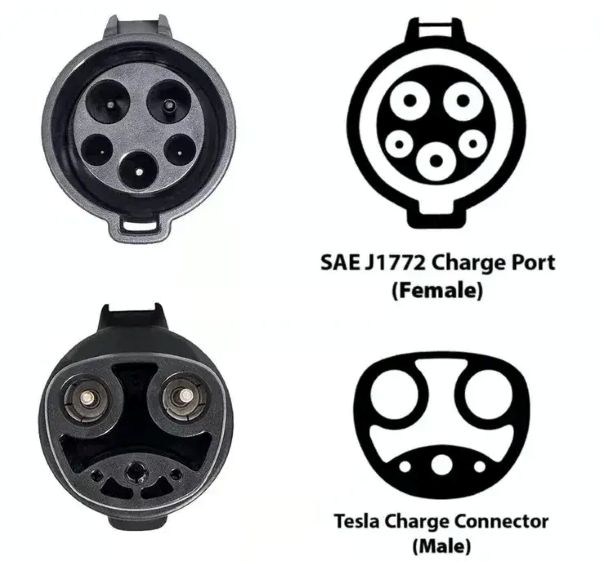


J1772 Plug: The Backbone of North American EV Charging Infrastructure
Introduction
LiCB Charge, a leading EV charger manufacturer in China, offers reliable AC and DC electric vehicle charging stations along with comprehensive charging solutions.
As electric vehicles (EVs) gain momentum across North America, the J1772 plug—also known as the SAE J1772 connector or simply the J-Plug—has emerged as the essential AC charging standard. Developed by the Society of Automotive Engineers (SAE), this connector is used by nearly every non-Tesla EV in the U.S. and Canada. It enables a universal, safe, and reliable way to transfer electricity from charging stations to EVs, supporting the growing electric mobility revolution.
From home chargers to public stations in shopping centers and office buildings, the J1772 plug ensures broad compatibility and convenient access for EV drivers. Tesla vehicles, while equipped with proprietary connectors, can still access J1772 stations using adapters, further unifying the charging network.
The J1772 connector is engineered with simplicity and safety in mind. It features five pins:
Two power pins: Deliver 120V or 240V AC electricity
One ground pin: Ensures electrical safety
Two communication pins: Facilitate smart communication between the charger and vehicle
The communication pins enable a handshake process that confirms proper connection and controls charging parameters to maximize safety and efficiency. The plug’s ergonomic, weatherproof design includes secure locking to prevent accidental disconnection, making it suitable for both indoor and outdoor use.
The J1772 supports AC charging, relying on the EV’s onboard charger to convert AC to DC.
Level 1 Charging (120V): Adds about 4–5 miles of range per hour. This slow charging method is perfect for overnight use at home using a standard outlet.
Level 2 Charging (240V): Adds roughly 25–30 miles of range per hour, ideal for home, workplace, and public charging stations. It requires dedicated EV supply equipment (EVSE) and a 240V outlet or hardwired connection.
Level 2 is the most popular charging method for daily use, offering faster charging without the need for costly DC fast chargers.
While versatile, the J1772 plug supports only AC charging. For rapid charging, drivers use DC fast chargers with connectors like CCS or CHAdeMO, which deliver high-voltage DC power directly to the battery, bypassing onboard converters.
Nonetheless, the J1772’s Level 2 charging speeds suffice for the majority of daily EV needs, especially overnight charging at home.
Universal Compatibility: Nearly every non-Tesla EV supports J1772, making it a true standard across multiple brands.
Widespread Availability: Public charging stations across North America predominantly feature J1772 connectors, easing trip planning and reducing compatibility concerns.
Cross-Platform Adaptability: Tesla drivers can use J1772 stations via adapters, expanding charging options.
Safe and Smart: Communication pins enable safety features like current control, charging delay, and lockout mechanisms to protect users and batteries.
Homeowners often upgrade from Level 1 to Level 2 chargers for faster charging:
Electrical Requirements: 240V outlet, 30–50 amp dedicated circuit, properly sized breakers.
Professional Installation: Recommended to hire licensed electricians to ensure safety, compliance, and necessary permits.
Smart Features: Modern chargers include Wi-Fi or Bluetooth connectivity, app controls, scheduling, and energy monitoring to optimize usage and reduce costs.
Durability: Outdoor units require weatherproof (NEMA-rated) enclosures for reliable performance.
Installation costs typically range from $750 to $2,100, covering the charger, electrical work, permits, and inspection. Incentives and rebates from utilities or governments may reduce these expenses significantly.
As North America moves toward charging standard consolidation, Tesla’s North American Charging Standard (NACS) is gaining adoption by major automakers like Ford, GM, Rivian, and Volvo starting in 2025. Despite this shift, the J1772 plug remains widely used and supported due to millions of EVs already on the road.
Public and private charging infrastructure will continue to accommodate J1772 for years, ensuring a smooth transition as new standards emerge.
The J1772 plug has been foundational to North America’s EV charging ecosystem. It delivers universal compatibility, safety, and ease of use for AC charging—whether at home, work, or public stations. As the EV market expands, the J1772 connector remains a vital link between today’s electric vehicles and tomorrow’s clean transportation future.Know more about Google SEO Directory
